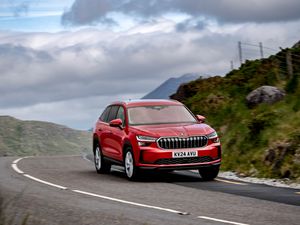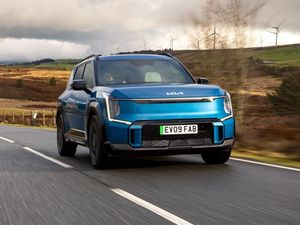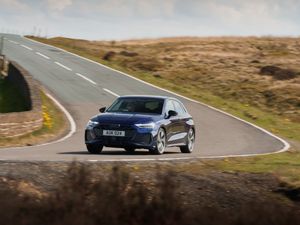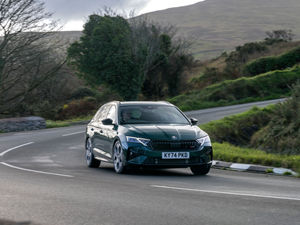First Drive: The Ford Mustang continues to be the definitive muscle car experience
Ford has given its iconic muscle car a facelift for 2018. Ryan Hirons heads to the south of France to try it out…
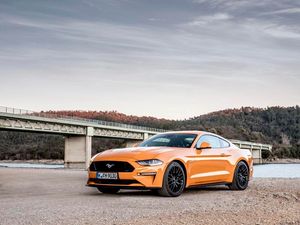
What is it?
It wasn’t too long ago that the Ford Mustang was first introduced to the UK, going on-sale officially here in 2016 for the first time in the model’s 44-year history – but barely two years on, and we have a facelifted car.
The iconic V8 muscle car has been quite a success since arriving in Europe – having sold more than 33,000 units since landing on this side of the pond – and the American firm is hoping more technology and a fresh face can continue its initial success.

The big focus on the facelifted Mustang for Ford has been improving its previous Euro NCAP safety rating from two stars to a targeted three. As a result, it now features pre-collision assist with pedestrian detection technology along with lane-keep assistance.
That’s not the only new thing, though. Providing fresh vocal chords to the eight-cylinder brute is an active exhaust system that features ‘Good Neighbour Mode’, which can be set to reduce exhaust noise between certain hours of the day to avoid disturbing the peace. There’s also the addition of optional ‘MagneRide’ adjustable suspension, which adjusts depending on the driving mode.

There’s no real change in the choice of engines on offer for the updated Ford Mustang, with a 2.3-litre turbocharged four-cylinder unit starting the range while the iconic 5.0-litre V8 remains too.
We drove the V8, which has received some minor fettling. Power is up to 444bhp from 410 on the original car, although torque remains unchanged at 529Nm. Paired to a six-speed manual gearbox (a 10-speed auto is also available), the 0-60mph sprint is done in 4.6 seconds with a 155mph top speed possible. It’s not exactly the last word in efficiency, with a claimed 22mpg on the combined cycle and CO2 emissions of 277g/km.
It’s an archaic feeling thing, with torque lazily coming in at around 4,000rpm before power really begins to build, which would be a disappointment in any other car – but it’s a Mustang, and it aids that old-school muscle feel that buyers will want.

On paper, a Mustang might sound like an overdose of understeer with large dimensions (4.8 metres long, and 2.1 wide) and a 1,743kg weight – but that’s not the case.
It’s no hot hatch through the corners, but it feels pretty composed and manageable on the road, likely thanks to the ‘MagneRide’ adaptive suspension. Steering also weighs up nicely in Sport+ mode, although more feel through the wheel wouldn’t go amiss.
Take the ‘Stang out on the motorway and you’ll have a very relaxed journey – if maybe one with a fair few fuel stops as a result of that poor economy. It feels truly at home on big, open roads, with the suspension providing a comfortable ride and the engine settling down to a quiet grumble at cruising speeds.

The Ford Mustang has never been a discreet looking thing, but a few visual tweaks have certainly given it even more presence on the road. New air vents have been added to the bonnet, while a revised lower grille creates an even more menacing look.
It’s not all show, though. The new front splitter increases downforce while the addition of ‘rocker shields’ to the wheel arches aid air flow under the car to reduce drag.
It’s not a classically beautiful design, but the aggressive, bold look continues to fit the mission statement of the Mustang perfectly. It’s one of the most brutal looking things on the road that’s sure to turn heads – especially so in the ‘Orange Fury’ paint finish on our car.
What’s it like inside?
To hit a £41k price point with the performance on offer, it’s clear to see Ford have cut corners inside the car. It’s definitely not a bad place to be – most things feel well-built and there’s few hard plastics to be found – but rivals do offer more.
Controls and switches in the centre console look and feel a tad outdated, while the faux leather upholstery is a bit hard to the touch.
Our test car was also fitted with optional Recaro leather seats. They’re fine to sit in, offering great support all round and plenty of comfort, but it does result in a cramped driving position that is a struggle to adapt to. Fitting these also removes the option of heated and ventilated seating – worth considering if you plan to use it as a long-distance cruiser.

The Mustang is pretty well equipped out of the box. For no extra cost, there’s the new lane keep and pre-collision technology, while adaptive cruise control, a 12-inch LCD instrument cluster, Ford’s Sync 3 infotainment system on a eight-inch screen, automatic LED headlights and a heated steering wheel are present. Mechanical features such as a limited-slip differential and the active exhaust system are also included. It’s a generous package, making this not just great for pound-per-performance, but also for tech too.
There’s a healthy amount of options to pick. Recaro seats will set you back an extra £1,700 (although we’d stick with the standard units) and for the trick ‘MagneRide’ suspension, you’ll be paying £1,600.

Fresh changes for the Ford Mustang haven’t revolutionised the brute, which is exactly what it didn’t need to do. It remains in its own league, offering an old-school, all-American muscle car experience here in the UK.
Sure, the interior may not be up to scratch with rivals at its price point, but they simply don’t offer the theatre and raw fun the Mustang brings to the table. In a world driven by electrification and autonomy, it’s a relief that a naturally aspirated, V8 monster with a manual gearbox still remains on sale. And a great one at that, too.

